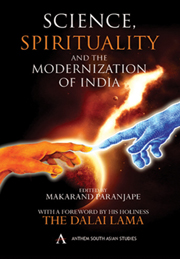Book contents
- Frontmatter
- Contents
- Notes on Contributors
- Foreword
- Editor's Preface
- I Science and Spirituality: East and West
- CHAPTER 1 Science, Spirituality and Modernity in India
- CHAPTER 2 Spiritual Pilgrimage: Indian and Western Perspectives; Spirituality, Logic and Science
- II Coming to Terms with Science: Some Change Agents
- III Building Bridges: Evolution, Consciousness and Healing
- IV Science and Spirituality: Culture, Society and Gender
CHAPTER 2 - Spiritual Pilgrimage: Indian and Western Perspectives; Spirituality, Logic and Science
from I - Science and Spirituality: East and West
Published online by Cambridge University Press: 05 March 2012
- Frontmatter
- Contents
- Notes on Contributors
- Foreword
- Editor's Preface
- I Science and Spirituality: East and West
- CHAPTER 1 Science, Spirituality and Modernity in India
- CHAPTER 2 Spiritual Pilgrimage: Indian and Western Perspectives; Spirituality, Logic and Science
- II Coming to Terms with Science: Some Change Agents
- III Building Bridges: Evolution, Consciousness and Healing
- IV Science and Spirituality: Culture, Society and Gender
Summary
Spirituality and science are regarded by many thinkers as two separate realms. Prominent among them is Immanuel Kant (1724–1804) who has said, ‘I must limit knowledge in order to leave room for faith’ (Kant, p.29). He created two realms – a realm of scientific knowledge and another realm of faith, morality and religion. What we normally call science is that which we can observe, experiment with, analyse, measure and prove. From that perspective, spirit or spirituality may be the last thing to be found under any microscope. The science of spirituality may not be so easily measured from the parameters used in normal science. I propose the role of logic between spirit and science. The insight into this proposal comes basically from the Upanishads in which the distinction has been made between para vidya and apara vidya at the level of knowledge and between Nihshreyas (attainment/fulfillment) and Abhyudaya (achievement) at the ethical level. The same dristi can be found in Avaita Vedanta traditions from medieval to modern India. However, in Western philosophy, post Renaissance, particularly during the Enlightenment, we come across a distinction between science and religion. This distinction, on the basis of principles, emerges as two separate realms in Immanuel Kant's Critique of Pure Reason (1781) as quoted above.
In its further development, we find that Hegel's Science of Logic places logic as the middle term between spirit and science. This is the position of Absolute Monism.
- Type
- Chapter
- Information
- Science, Spirituality and the Modernisation of India , pp. 15 - 44Publisher: Anthem PressPrint publication year: 2009
- 1
- Cited by



